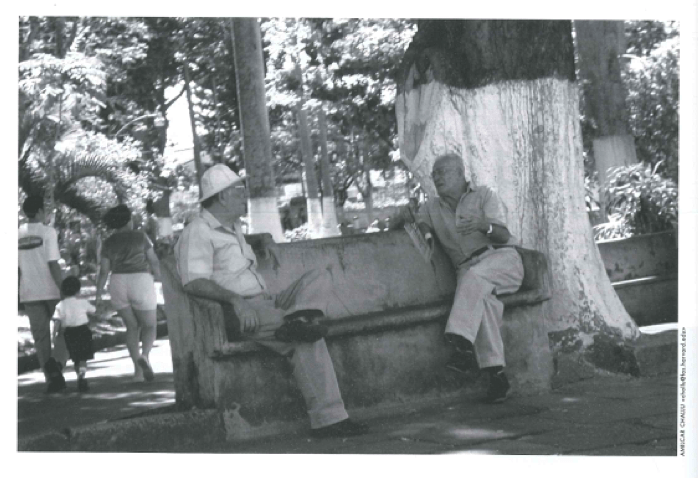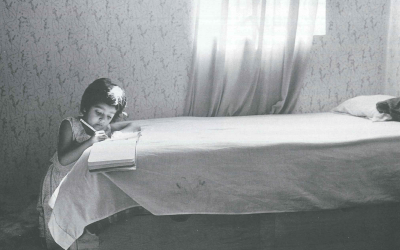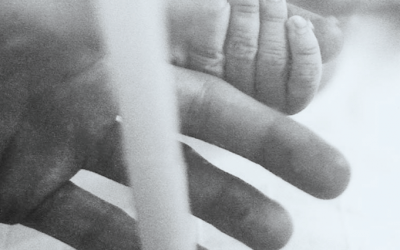Legislatures and Political Accountability
Building Credibility

In March 2000, while researching legislatures in several Latin American countries, I found myself in Caracas. This promised to be a quiet stop given that Venezuela was, at the time, without a real legislature. Its Congress had been supplanted the previous year by an assembly summoned by President Hugo Chavez to rewrite the constitution. That body had disbanded once the new charter was ratified. Elections for a new National Assembly would not happen for another four months, and the legislature, such as it was, was an appointed 20-member committee known as Congressillo – the little Congress.
Legislative support staff were still around, however, and largely unoccupied. This presented me with an opportunity to explore my interests in the details of procedure, and in how information about what goes on inside the legislature gets to those outside. In a control room above the main parliamentary chamber, the technical support staff showed me the elaborate equipment for recording legislators’ attendance, speeches and debate, and votes. In the empty chamber, we gave the machines a test run. My request to see records of some actual votes, however, could not be obliged – the machines had never been used.
The voting machines had been installed three years before, and the technicians had stood ready during the last years of the previous Congress, the months of deliberation in the Constituent Assembly, and the occasional meetings of the Congressillo. Yet they had never been directed by the legislative leaders to record each member vote on a single bill or amendment. As a result, only the bottom-line result – approval or rejection – found its way into the official transcripts. For those outside the legislative sessions, there was no record of who voted how.
VOTING, RECORD-KEEPING AND CREDIBILITY
It’s hard to imagine U.S. politics without legislative voting records, At every election, each candidate’s record is scrutinized – most closely by her or his opponent – and analyzed by interest groups, potential contributors, in campaign commercials and literature, in candidate debates and in the press. Legislators, in turn, cast an eye toward their next election every time they cast a vote.
Outside the United States, and in Latin America in particular, not all legislatures fit this pattern. The Brazilian and Chilean congresses record most votes and post the records on their websites. Peru began to do the same a couple years ago, and just this year Argentina adopted the practice for some votes. Mexico and Nicaragua record most votes, but public access to that information is limited. Bolivia, Colombia, Ecuador, Costa Rica, El Salvador, Guatemala, Honduras, Paraguay, Uruguay and Venezuela record very few notes and access to those that are recorded is spotty.
Even when legislative votes are public, the vast majority of citizens are not watching closely. Most people would probably be hard pressed to think of a less engrossing pastime than examining the record vote by vote. Nevertheless, journalists, civic organizations, and other politician reliably transfer the record into the public discourse, and citizens can count on learning about anything exceptional at election time.
We are just beginning to learn about how political accountability works in Latin America’s democracies. Much of the region adopted civilian, elected government in the 1970’s and ’80’s after periods of authoritarian rule. In the early years after these transitions, scholarly attention focused on whether the democratic experiments would survive. By and large, they have, and attention is shifting to how the relationship between citizens and their representatives operates. Do politicians get rewarded for good performance and punished for bad? What counts as acceptable and unacceptable performance? Are citizens paying attention, and can they get information they need in order to demand accountability?
The news for many countries suggests that citizens are less than satisfied with the performance of their representatives and the accountability produced by their political systems. Argentina’s impromptu citizens’ committees (caceroleros) are roaming groups of street protesters (piquenteros) sum up their attitude toward the whole political class with the slogan, “Que se vayan todos!” – roughly “Throw them all out!” Elsewhere, public opinions surveys frequently show legislatures near the bottom of the list of public institutions in terms of public trust and confidence.
By itself, making the record public does not guarantee accountability; but voting is the bottom line across legislatures. All legislatures make a wide variety of critical political decisions, and mostly all important legislative decisions must be put to a vote.
Without a record of who voted how, it is extremely difficult to hold representatives’ feet to the fire for the decisions they make, and for elections to serve as vehicles for accountability. Legislators often would rather not have to defend their actions publicly, but establishing their credibility depends on it.
PARLIAMENTARISM COMES TO LATIN AMERICA
Enhancing the credibility of legislatures is particularly important because legislatures have begun to play an increasingly pivotal role in Latin American politics. Hidden amid the more spectacular recent headlines – of economic meltdown in Argentina and the contagion to Uruguay, of civil unrest and the failed military coup in Venezuela, of the endemic violence in Colombia, and the ongoing corruption investigations in Peru – is a pattern that may mark a fundamental constitutional change in the region’s presidential regimes. They have started operating as though they are parliamentary.
Under presidentialism, the chief executive is popularly elected and serves for a fixed term alongside a separately elected legislature. In parliamentary systems, only the legislature is popularly elected and it, in turn, chooses the executive, whose members serve only so long as they enjoy majority support in the legislature. If the executive loses the confidence of the legislature, the cabinet can be removed and replaced at any time by a majority vote.
So much for the political science review. How is this relevant to current Latin American politics? The last few years have seen a number of political crises in the region triggered by precipitous drops in support for presidents: in Ecuador in 1997 and 2000, in Peru in 2000, in Argentina last December, and then in Venezuela this past April. Critics of presidential government point out that these moments can easily become regime crises because there is no constitutional mechanism for removing a chief executive who has lost the ability to govern, as there is under parliamentarism.
Looking only slightly deeper into Latin American history, it is easy to find occasions where government crises, and conflicts between presidents and legislatures in particular, triggered complete breakdowns of democracy. In Brazil in 1964, Peru in 1968, Chile in 1973, and Argentina in 1976, Latin American militaries stepped in and displaced civilian politicians, imposing long periods of authoritarian rule.
The experience of the 1960s and 1970s suggested that presidentialism, with its rigid separation of powers and fixed terms, was at least partly responsible for ushering in dictatorships. By this account, the trigger mechanism was conflict between the executive and legislative branches, which induced some decisive actor – the military, or perhaps the president himself – to resolve the impasse by casting aside constitutional restraints.
During the hemispheric transition back to civilian, elected government that started in the late 1970s, would-be political reformers in a number of countries pushed constitutional reforms to replace presidentialism with parliamentarism. The idea was greeted with skepticism by incumbent politicians reluctant to change the rules of the game under which they had come to power. When a 1993 referendum offering Brazilian voters the option of changing to parliamentarism was rejected, the prospects for such a radical reform appeared dead
So the constitutions still spell out presidential systems. But the ground underneath them has shifted. One change is that Latin American militaries are now unable, or unwilling, to intervene in politics for the long haul. Now, when presidents and legislatures find themselves at a stand-off, neither necessarily holds the option of knocking on the barracks door to as for help. Another change is at the international level. Latin America’s major democracies are now willing to isolate, diplomatically and economically, neighboring governments that breach democratic procedure.
The effect of these changes is visible in how government crises in the region are resolved. In the past decade, there have been thirteen regime changes in which one or the other branch has been removed preemptively. In eleven of those cases, the president has departed, and the office has been filled, most frequently, with a congressionally chosen successor – precisely the safety valve built into parliamentarism that made it attractive to Latin American reformers.
This norm does not conform to the letter of Latin America’s constitutions, which remain presidential. Nevertheless, the proactive of presidential replacement by legislatures has not attracted opposition from neighboring governments, as do military coups. Moreover, these moves appear to have come to be understood by the Latin American politicians as the new, informal rules of the game.
Consider the approach of Argentine President Eduardo Duhalde as he presented controversial banking legislation in April that caused even legislators in his own Peronist party to balk. In a press conference, the president suggested that, “If the Parliament is not in agreement, it will have to elect another president.”
Duhalde was seeking to make the bill an issue of confidence in his government – a strategy taken directly from the parliamentary play book. He failed in the immediate term. His bill foundered, and he did not back up his implicit threat to resign. However, the mere fact that the president would even present the initiative in such a manner indicates a fundamental change in the strategic political environment – one not reflected in the constitution, but increasingly in practice.
Venezuelan President Chávez has not yet begun offering policy initiatives as matters of government confidence, but after an aborted coup temporarily removed him in April, the anti-Chavistas have obsessed over how to make the condition permanent. Meanwhile, splits and instability have reduced Chávez’s once-overwhelmingly legislative coalition to a narrow majority. Seizing on this trend, the opposition now focuses on building an Assembly majority to dump Chavez, despite the fact that the Venezuelan Constitution does not formally provide for a no-confidence vote on the president.
STRONG LEGISLATURES, TRANSPARENCY, AND THE QUALITY OF DEMOCRACY
What do these developments suggest about the condition of democracy in Latin America? Although breaches in constitutional procedure of any sort are not encouraging, legislative replacements of presidents are generally peaceful affairs, and have a stronger claim to democratic legitimacy than military replacement. In the broad view, stronger legislatures in Latin America would improve overall prospects for democratic performance.
Many countries in the region have historically been characterized by dominant presidents and ineffectual legislatures. However, the best records of democratic governance – Costa Rica and Uruguay – are found in countries where legislatures are viable counterparts to the president. For all their unwieldiness, legislatures are more inclusive institutions than presidencies, affording some voice to groups shut out of executive office. Systems with stronger legislatures may not make decisions quickly, but they are often able to resolve highly charged policy conflicts through compromise and accommodation. Decision making processes in legislatures also have the potential to be public and visible, providing a measure of transparency often lacking in the executive branch.
It is here that the matter of public voting records assumes prominence – even in some environments where other, more obviously pressing issues command attention. This past August, Alvaro Uribe assumed Colombia’s presidency in the midst of escalating violence in that country’s civil war, including a mortar attack on the presidential inauguration itself. Uribe is well known for his promises to take a hard military line against Colombia’s rebel groups. Yet the first legislative proposal he sent to Congress was a package of reforms touted as enhancing the transparency of the policymaking process and rebuilding the credibility of lawmakers. The first item in Uribe’s list of proposed reforms is that all votes in the Colombian Congress be recorded and immediately made public.
Uribe’s proposal may fail in the legislature – and if so, most likely on an unrecorded vote. His priorities, moreover, may be misplaced in the context of Colombia’s wider political crisis. Yet the significance he attaches to the apparently mundane issue of recorded legislative voting is arresting at a time when his country’s political institutions are under such sever stress. It may also be indicative of the importance of boosting the credibility of Latin America’s lawmakers in a period when the principle of establishing governments through competitive elections appears to have taken hold, but when public disillusionment with the performance of those governments is widespread.
Legislatures have moved front and center in Latin American politics of late, and they are struggling on various fronts to adapt to the position. Moves to improve transparency in some countries are encouraging and, if not always greeted enthusiastically by legislators themselves, are necessary to reduce credibility deficits. Constitutions remain presidential, but the means of resolving government crises in the region has come to resemble parliamentarism. The crises themselves are troubling, but if their outcomes herald the development of more powerful and more accountable legislatures, we should welcome the trend.
Fall 2002
John M. Carey, is an Associate Professor of Political Science at Washington University in St. Louis, and will be the David Rockefeller Visiting Associate Processor of Government at Harvard during spring semester 2003. He has written extensively on legislative-executive relations in Latin America.
Related Articles
Editor’s Letter: Democracy
Ellen Schneider’s description of Sandinista leader Daniel Ortega in her provocative article on Nicaraguan democracy sent me scurrying to my oversized scrapbooks of newspaper articles. I wanted to show her that rather than being perceived as a caudillo
Battro Named to Pontifical Academy
Antonio M. Battro M.D., Ph.D. has been named to The Pontifical Academy of Sciences, the oldest science academy in the world, established by Galileo 400 years ago. Battro, Robert F. Kennedy…
Entre los panales y el poder
Cuando Jacqueline van Rysselberghe fue informada en Noviembre último que ella debería dejar su puesto como alcaldesa de Concepción, una de las ciudades mas grandes e…




